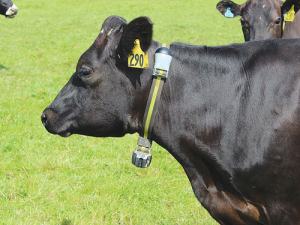The SenseTime monitoring system is a good fit with his automation and in-shed feeding.
Robinson is a fourth-generation farmer at Robinson Dairy Farm Ltd, milking 900 cows at the peak and 750 over winter. The property is home to Royal Oak Holstein Friesian stud and has been in the family for almost 100 years.
Alastair Robinson has been there full time since 1993, growing the farm by buying neighbouring property and lease blocks as they came to market. And he’s had some luck.
Bought chiefly for mating, the SenseTime system has been operating for four weeks and is improving heat detection and insemination accuracy.
“As our mating is spread year-round the focus shifts from staff to some degree,” he says. “We also were keen to see if we could pick up sick cows sooner and have a better chance of successfully treating them.
“We were getting about 1-2 cows per milking that the staff had missed for mating, but this morning we had four picked up, which was great.”
As the technology is new to the farm, he decided to continue with heat patches until he was confident in the technology.
“With the number of cows that the collars are picking up -- over the heat patches -- I’ve got 100% confidence now”.
He said the farm has hedge lines that can set off the heat patches, but the collars don’t have this problem. The technology determines true heats.
For cashflow and workload reasons, Robinson decided to fit 200 collars a month and now has 425. He started with the empty cows he is mating for autumn and the early autumn cavers he is starting to mate now.
“It’s helpful and accurate so far; the collars have picked up cows the staff have missed, including one silent heat. It might have picked up one cow we didn’t necessarily agree with, but we will find out in a couple of weeks if it was right.
“We won’t see the full benefit until we’ve had them on longer, but I can easily see it saving us $20-$30/cow/year. They’ll pay for themselves in no time I reckon.”
The farm uses pedigree straws costing about $40/straw, so if cows are inseminated on a false heat the cost of wasted straws and heat patches can be a lot.
Robinson and his staff have found the technology easy to learn, using it for present need.
The collars start to produce accurate data within about 10 days of application. Robinson had organised a training session with the Centre for Dairy Excellence beyond this 10-day period.
“About three days before the training, accurate data started to come through and I was able to use it easily. I don’t see myself as a tech-savvy person, so it was great to understand it before the training.”
The application of the collars has also gone well. Robinson fits them himself and enters the numbers into the auto-drafter. This process is the most practical due to the non-stop season and he finds the cows are more relaxed doing it this way.
They use the system twice a day after each milking by monitoring the heat graphs for specific cows.
“We monitor the cow’s optimum mating window and if she is a little early we hold off inseminating until the next milking”.















